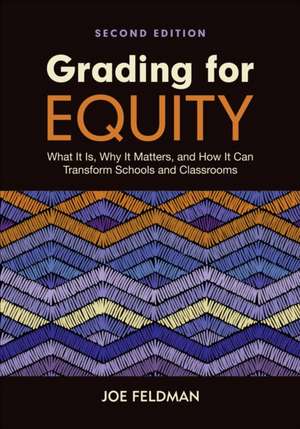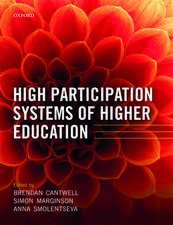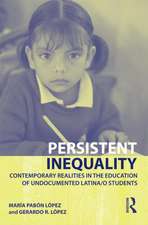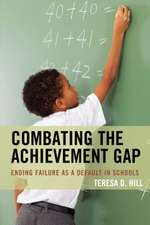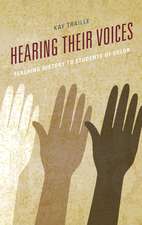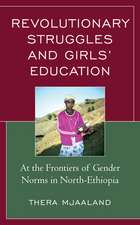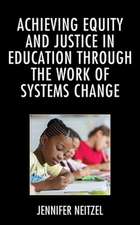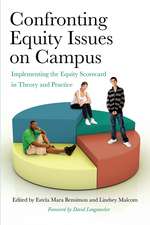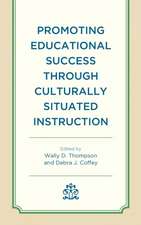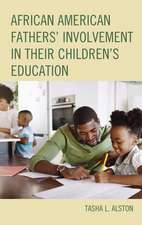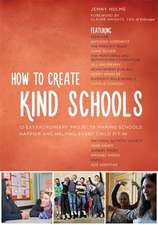Grading for Equity
Autor Joe Feldmanen Limba Engleză Paperback – 19 sep 2023
| Toate formatele și edițiile | Preț | Express |
|---|---|---|
| Paperback (2) | 222.42 lei 3-5 săpt. | +22.87 lei 7-13 zile |
| SAGE Publications – 8 oct 2018 | 222.42 lei 3-5 săpt. | +22.87 lei 7-13 zile |
| SAGE Publications – 19 sep 2023 | 257.59 lei 3-5 săpt. | +32.86 lei 7-13 zile |
Preț: 257.59 lei
Nou
Puncte Express: 386
Preț estimativ în valută:
49.30€ • 51.39$ • 41.04£
49.30€ • 51.39$ • 41.04£
Carte disponibilă
Livrare economică 14-28 decembrie
Livrare express 30 noiembrie-06 decembrie pentru 42.85 lei
Preluare comenzi: 021 569.72.76
Specificații
ISBN-13: 9781071876602
ISBN-10: 1071876600
Pagini: 344
Dimensiuni: 181 x 254 x 27 mm
Greutate: 0.75 kg
Ediția:2nd edition
Editura: SAGE Publications
ISBN-10: 1071876600
Pagini: 344
Dimensiuni: 181 x 254 x 27 mm
Greutate: 0.75 kg
Ediția:2nd edition
Editura: SAGE Publications
Recenzii
“This book will stop educators who want to improve their practices with underserved students right in their tracks. Feldman offers an insightful invitation to teachers who dare change the ways in which we have been taught to grade students’ products. He demonstrates how our grading practices are grossly under-substantiated and too often unquestioned, and he challenges educators to build equitable assessment tools and mechanisms to support learning and development of all students. Grading for Equity penetrates macro-level grading policies to transform micro-level teaching practices that embrace the cultural and the contextual. A must read for justice-centered educators.”
"Wow, Wow Wow!!! This book hooked me as a not-to-be-missed read right from the Prologue. Joe Feldman makes a strong case for shared grading practices to overcome the inequity of traditional grading, with solid reasoning, well-chosen research evidence, and perhaps most significantly, the powerful and frequent use of teacher voice. The chapters’ organizing structure encourages thoughtful and reflective reading, and will be particularly beneficial for book study within PLCs. . . . The main message of the book for me is summed up in this quote, 'We teachers cannot continue to sacrifice the integrity and reliability of our grades at the altar of professional autonomy.'"
"There is growing awareness within the industry of education that traditional grading practices have become a barrier to meaningful student learning. One dilemma is that there is a lack of resources to support educators who want to adopt new grading practices that are both accurate and equitable. Joe Feldman addresses this need with his book, Grading for Equity. Joe skillfully makes a compelling argument for change and offers specific ways educators can make profound differences to their grading practices. Students become intrinsically motivated to learn when their grades accurately measure where they are in the learning process. Students who typically give up any hope of success can now approach learning with a positive growth mindset. Grading for Equity will provide clarity and tools for an individual instructor or as a book study for an entire organization."
"Joe Feldman peels back the curtain and shows the many flaws of our traditional grading system. His arguments are convincing - and the alternatives he proposes are both practical and powerful. Reading this book will make you re-think the way you assess students and will inspire you to enact a system that encourages revision and redemption instead of compliance and corruption. "
"We don’t usually think of grading when talking about equity, but in Grading for Equity: What It Is, Why It Matters, and How It Can Transform Schools and Classrooms, Joe Feldman helps us see why grading is an integral part of an equity agenda. He shows us how we can use grading to help students become the leaders of their own learning and lift the veil on how to succeed. He reminds us that authentic assessment and transparent grading are essential parts of a culturally responsive classroom. This must-have book will help teachers learn to implement improved, equity-focused grading for impact."
"Wow, Wow Wow!!! This book hooked me as a not-to-be-missed read right from the Prologue. Joe Feldman makes a strong case for shared grading practices to overcome the inequity of traditional grading, with solid reasoning, well-chosen research evidence, and perhaps most significantly, the powerful and frequent use of teacher voice. The chapters’ organizing structure encourages thoughtful and reflective reading, and will be particularly beneficial for book study within PLCs. . . . The main message of the book for me is summed up in this quote, 'We teachers cannot continue to sacrifice the integrity and reliability of our grades at the altar of professional autonomy.'"
"There is growing awareness within the industry of education that traditional grading practices have become a barrier to meaningful student learning. One dilemma is that there is a lack of resources to support educators who want to adopt new grading practices that are both accurate and equitable. Joe Feldman addresses this need with his book, Grading for Equity. Joe skillfully makes a compelling argument for change and offers specific ways educators can make profound differences to their grading practices. Students become intrinsically motivated to learn when their grades accurately measure where they are in the learning process. Students who typically give up any hope of success can now approach learning with a positive growth mindset. Grading for Equity will provide clarity and tools for an individual instructor or as a book study for an entire organization."
"Joe Feldman peels back the curtain and shows the many flaws of our traditional grading system. His arguments are convincing - and the alternatives he proposes are both practical and powerful. Reading this book will make you re-think the way you assess students and will inspire you to enact a system that encourages revision and redemption instead of compliance and corruption. "
"We don’t usually think of grading when talking about equity, but in Grading for Equity: What It Is, Why It Matters, and How It Can Transform Schools and Classrooms, Joe Feldman helps us see why grading is an integral part of an equity agenda. He shows us how we can use grading to help students become the leaders of their own learning and lift the veil on how to succeed. He reminds us that authentic assessment and transparent grading are essential parts of a culturally responsive classroom. This must-have book will help teachers learn to implement improved, equity-focused grading for impact."
Cuprins
ACKNOWLEDGMENTS
ABOUT THE AUTHOR
PROLOGUE: MALLORY’S DILEMMA
PART I: FOUNDATIONS
CHAPTER 1. WHAT MAKES GRADING SO DIFFICULT TO TALK ABOUT (AND EVEN HARDER TO CHANGE)?
Grading as Identity
Grading and Our “Web of Belief”
Who Is This Book For?
Blending the Technical and Theoretical
How Is This Book Organized?
A Final Word
Summary of Concepts / Questions to Consider
CHAPTER 2. A BRIEF HISTORY OF GRADING
The Twentieth Century Context
Impact on Schools
Grading in the Twentieth Century
Summary of Concepts / Questions to Consider
PART II: THE CASE FOR CHANGE: HOW TRADITIONAL GRADING THWARTS EFFECTIVE AND EQUITABLE TEACHING AND LEARNING
CHAPTER 3. HOW TRADITIONAL GRADING STIFLES RISK-TAKING AND SUPPORTS THE “COMMODITY OF GRADES”
Risk-Taking, Trust, and the Teacher–Student Relationship
The “Commodity of Grades” and Extrinsic Motivation
Summary of Concepts / Questions to Consider
CHAPTER 4. TRADITIONAL GRADING HIDES INFORMATION, INVITES BIASES, AND PROVIDES MISLEADING INFORMATION
Traditional Grading Evaluates Both a Student’s Content Knowledge as Well as Their Behaviors, and Invites Subjectivity and Bias
Implicit Bias and Traditional Grading
The “Omnibus” Grade: A Barrel-ful of Information in a Thimble-Size Container
A Tale of Two Students: Tangela and Isabel
Grade Hacks
The Impact of Variable and Unreliable Grading
Summary of Concepts / Questions to Consider
CHAPTER 5. TRADITIONAL GRADING DEMOTIVATES AND DISEMPOWERS
Disengagement and Disempowerment
Motivating Students to Do the Wrong Thing
So Where Do We Go From Here?
Summary of Concepts / Questions to Consider
CHAPTER 6. A NEW VISION OF GRADING
Supporting the Pillars: Coherence
A Measured Vision
Summary of Concepts / Questions to Consider
PART III: EQUITABLE GRADING PRACTICES
CHAPTER 7. PRACTICES THAT ARE MATHEMATICALLY ACCURATE
The Zero
The 0-100-Percentage Scale: Early Use and Enduring Flaws
The 0–100 Scale’s Orientation Toward Failure
Minimum Grading
The 0–4 Grading Scale
Summary of Concepts / Questions to Consider
CHAPTER 8. PRACTICES THAT ARE MATHEMATICALLY ACCURATE (CONTINUED)
The Problems With Averaging
Weighting More Recent Performance
Examining the Group Grade
Encouraging Productive Group Work Without a Group Grade
Our Accuracy Pillar: A Final Thought
Summary of Concepts / Questions to Consider
CHAPTER 9. PRACTICES THAT VALUE KNOWLEDGE, NOT ENVIRONMENT OR BEHAVIOR
Examining Extra Credit
If the Work Is Important, Require It; If It’s Not, Don’t Include It in the Grade
Grading the Work, Not the Timing of the Work
What’s the Alternative to Lowering Grades for Late Work?
Alternative (Non-Grade) Consequences for Cheating
Excluding “Participation” and “Effort” From the Grade
Summary of Concepts / Questions to Consider
CHAPTER 10. PRACTICES THAT VALUE KNOWLEDGE, NOT ENVIRONMENT OR BEHAVIOR (CONTINUED)
Homework
The Impact of Including Homework in the Grade: Student Voices and Copying
Reframing Homework
Grades Based Entirely on Summative Assessment Performance
Grades to Teach Students, Not to Control Them
Summary of Concepts / Questions to Consider
CHAPTER 11. PRACTICES THAT SUPPORT HOPE AND A GROWTH MINDSET
Our Understanding of Motivation
Grades and Their Impact on Student Motivation
The Role of Mistakes in Learning
Minimum Grading (A Revisit)
Renaming Grades
Retakes and Redos
Retakes: Frequent Approaches
Retakes: Common Concerns
Summary of Concepts / Questions to Consider
CHAPTER 12. PRACTICES THAT “LIFT THE VEIL”
The Veils in Our Schools, and “Hostile Attributional Bias”
Rubrics: What Are They, and Why?
Scoring Rubrics and Grade Book Entries
Using Rubrics to Empower Students
“Lifting the Veil” for Tests: The Opacity of Points
Beyond Points: Standards Scales
The Effects of Standards Transparency
Standards-Based Grade Books
Veils, Rubrics, and the “Real World”
Summary of Concepts / Questions to Consider
CHAPTER 13. PRACTICES THAT BUILD “SOFT SKILLS” WITHOUT INCLUDING THEM IN THE GRADE
“Soft Skills”
Grading as Feedback
Preparation for the “Real World”
Whose “Real World” Are We Talking About?
Connecting Soft Skills to Academic Success
Two Grades: Academic and “Soft Skills”
The Twenty-First Century’s Soft Skill: Self-Regulation
Creating a Community of Feedback
Student Trackers and Goal-Setting
Summary of Concepts / Questions to Consider
CHAPTER 14. PUTTING IT ALL TOGETHER: NICK AND CATHY
Nick: Rethinking Assessments: Getting Away From the Games, and Focusing on Learning
Cathy: A Clearer Vision of Excellence
Summary of Concepts / Questions to Consider
EPILOGUE: A RETURN TO MALLORY’S SCHOOL
BIBLIOGRAPHY
INDEX
ABOUT THE AUTHOR
PROLOGUE: MALLORY’S DILEMMA
PART I: FOUNDATIONS
CHAPTER 1. WHAT MAKES GRADING SO DIFFICULT TO TALK ABOUT (AND EVEN HARDER TO CHANGE)?
Grading as Identity
Grading and Our “Web of Belief”
Who Is This Book For?
Blending the Technical and Theoretical
How Is This Book Organized?
A Final Word
Summary of Concepts / Questions to Consider
CHAPTER 2. A BRIEF HISTORY OF GRADING
The Twentieth Century Context
Impact on Schools
Grading in the Twentieth Century
Summary of Concepts / Questions to Consider
PART II: THE CASE FOR CHANGE: HOW TRADITIONAL GRADING THWARTS EFFECTIVE AND EQUITABLE TEACHING AND LEARNING
CHAPTER 3. HOW TRADITIONAL GRADING STIFLES RISK-TAKING AND SUPPORTS THE “COMMODITY OF GRADES”
Risk-Taking, Trust, and the Teacher–Student Relationship
The “Commodity of Grades” and Extrinsic Motivation
Summary of Concepts / Questions to Consider
CHAPTER 4. TRADITIONAL GRADING HIDES INFORMATION, INVITES BIASES, AND PROVIDES MISLEADING INFORMATION
Traditional Grading Evaluates Both a Student’s Content Knowledge as Well as Their Behaviors, and Invites Subjectivity and Bias
Implicit Bias and Traditional Grading
The “Omnibus” Grade: A Barrel-ful of Information in a Thimble-Size Container
A Tale of Two Students: Tangela and Isabel
Grade Hacks
The Impact of Variable and Unreliable Grading
Summary of Concepts / Questions to Consider
CHAPTER 5. TRADITIONAL GRADING DEMOTIVATES AND DISEMPOWERS
Disengagement and Disempowerment
Motivating Students to Do the Wrong Thing
So Where Do We Go From Here?
Summary of Concepts / Questions to Consider
CHAPTER 6. A NEW VISION OF GRADING
Supporting the Pillars: Coherence
A Measured Vision
Summary of Concepts / Questions to Consider
PART III: EQUITABLE GRADING PRACTICES
CHAPTER 7. PRACTICES THAT ARE MATHEMATICALLY ACCURATE
The Zero
The 0-100-Percentage Scale: Early Use and Enduring Flaws
The 0–100 Scale’s Orientation Toward Failure
Minimum Grading
The 0–4 Grading Scale
Summary of Concepts / Questions to Consider
CHAPTER 8. PRACTICES THAT ARE MATHEMATICALLY ACCURATE (CONTINUED)
The Problems With Averaging
Weighting More Recent Performance
Examining the Group Grade
Encouraging Productive Group Work Without a Group Grade
Our Accuracy Pillar: A Final Thought
Summary of Concepts / Questions to Consider
CHAPTER 9. PRACTICES THAT VALUE KNOWLEDGE, NOT ENVIRONMENT OR BEHAVIOR
Examining Extra Credit
If the Work Is Important, Require It; If It’s Not, Don’t Include It in the Grade
Grading the Work, Not the Timing of the Work
What’s the Alternative to Lowering Grades for Late Work?
Alternative (Non-Grade) Consequences for Cheating
Excluding “Participation” and “Effort” From the Grade
Summary of Concepts / Questions to Consider
CHAPTER 10. PRACTICES THAT VALUE KNOWLEDGE, NOT ENVIRONMENT OR BEHAVIOR (CONTINUED)
Homework
The Impact of Including Homework in the Grade: Student Voices and Copying
Reframing Homework
Grades Based Entirely on Summative Assessment Performance
Grades to Teach Students, Not to Control Them
Summary of Concepts / Questions to Consider
CHAPTER 11. PRACTICES THAT SUPPORT HOPE AND A GROWTH MINDSET
Our Understanding of Motivation
Grades and Their Impact on Student Motivation
The Role of Mistakes in Learning
Minimum Grading (A Revisit)
Renaming Grades
Retakes and Redos
Retakes: Frequent Approaches
Retakes: Common Concerns
Summary of Concepts / Questions to Consider
CHAPTER 12. PRACTICES THAT “LIFT THE VEIL”
The Veils in Our Schools, and “Hostile Attributional Bias”
Rubrics: What Are They, and Why?
Scoring Rubrics and Grade Book Entries
Using Rubrics to Empower Students
“Lifting the Veil” for Tests: The Opacity of Points
Beyond Points: Standards Scales
The Effects of Standards Transparency
Standards-Based Grade Books
Veils, Rubrics, and the “Real World”
Summary of Concepts / Questions to Consider
CHAPTER 13. PRACTICES THAT BUILD “SOFT SKILLS” WITHOUT INCLUDING THEM IN THE GRADE
“Soft Skills”
Grading as Feedback
Preparation for the “Real World”
Whose “Real World” Are We Talking About?
Connecting Soft Skills to Academic Success
Two Grades: Academic and “Soft Skills”
The Twenty-First Century’s Soft Skill: Self-Regulation
Creating a Community of Feedback
Student Trackers and Goal-Setting
Summary of Concepts / Questions to Consider
CHAPTER 14. PUTTING IT ALL TOGETHER: NICK AND CATHY
Nick: Rethinking Assessments: Getting Away From the Games, and Focusing on Learning
Cathy: A Clearer Vision of Excellence
Summary of Concepts / Questions to Consider
EPILOGUE: A RETURN TO MALLORY’S SCHOOL
BIBLIOGRAPHY
INDEX
Notă biografică
Joe Feldman has worked in education at the local and national levels for over twenty years in both charter and district school contexts, and as a teacher, principal, and district administrator. He began his career as a high school English and American history teacher in Atlanta Public Schools and was the founding principal of a charter high school in Washington, DC. He has been the Director of Charter Schools for New York City Department of Education, the Director of K¿12 Instruction in Union City, California, and was a Fellow to the Chief of Staff for U.S. Secretary of Education Richard Riley. Joe is currently CEO of Crescendo Education Group (crescendoedgroup.org), a consulting organization that partners with schools and districts to help teachers use improved and more equitable grading and assessment practices. Joe graduated from Stanford University, Harvard Graduate School of Education, and NYU Law School. He is the author of several articles on grading, assessment, and equity, and the author of Teaching Without Bells: What We Can Learn from Powerful Practice in Small Schools (Paradigm). He lives in Oakland, California with his wife and two children.
Descriere
Descriere de la o altă ediție sau format:
This book delivers the research base, tools, and courage to tackle one of the most challenging and emotionally charged conversations in today's schools: our inconsistent grading practices and the ways they can inadvertently perpetuate the achievement and opportunity gaps among our students.
This book delivers the research base, tools, and courage to tackle one of the most challenging and emotionally charged conversations in today's schools: our inconsistent grading practices and the ways they can inadvertently perpetuate the achievement and opportunity gaps among our students.
